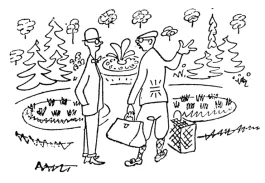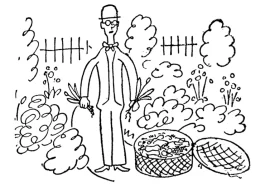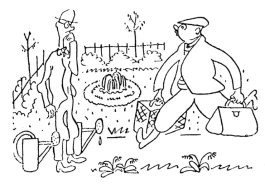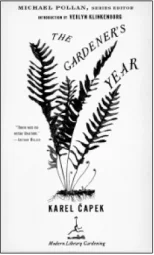
I have long been in love with The Gardener’s Year, that most beautiful of garden reads. (Indeed, I first ran an excerpt from it back in GP#4!) How odd its existence! The author was a Czechoslovakian playwright and science fiction writer—he invented the word “robot”! Yet Capek was a passionate gardener, and at one point penned a book that is at once the funniest, most passionate, and most gracefully written garden book I’ve ever read. The Gardener’s Year was published in 1927 and charmingly illustrated by Karel’s brother, Josef. It’s still in print today, thank goodness. Let’s start the Summer Isssue with a short summer passage.
August usually is the time when the amateur gardener forsakes his garden of wonder and goes on leave. The whole year long he vehemently swore that this year he would not go anywhere, that a garden is worth more than all summer resorts, and that he, the gardener, was not such a fool and ass as to be harassed by trains and all the devils; nevertheless, when summer sets in even he deserts the town, either because the nomadic instinct has awakened in him or to keep his neighbors from talking. He departs, however, with a heavy heart, full of fears and cares for his garden; and he will not go until he has found a friend or relation to whom he entrusts his garden for that time.
“Look here,” he says, “there is nothing to be done now in the garden in any case; if you come and look once in three days, that will be quite enough, and if something here and there is not in order, you must write me a card, and I will come. So, I am relying on you then? As I said, five minutes will be enough, just a glance round.”
Then he leaves, having laid his garden upon the heart of an obliging fellow-creature. Next day the fellow-creature receives a letter: “I forgot to tell you that the garden has to be watered every day, the best times for doing it are five in the morning and toward seven in the evening. It is practically nothing, you only fasten the hose to the hydrant and water for a few moments. Will you please water the conifers all over as they stand, and thoroughly, and the lawn as well? If you see any weeds, pull them out. That’s all.”

A day after: “It is frightfully dry, will you give every rhododendron about two buckets of water, and each conifer five buckets, and other trees about four buckets? The perennials, which are now in flower, ought to have a good deal of water—write by return post what is in flower. Withered stalks must be cut off! It would be a good thing if you loosened all the beds with a hoe; the soil breathes much better then. If there are plant-lice on the roses, buy tobacco extract, and syringe them with it while the dew is on, or after a rain. Nothing else need be done at present.”
The third day: “I forgot to tell you that the lawn must be cut; you can do it easily with the mower, and what the mower does not take, you cut with clippers. But beware! after mowing the grass it must be well raked, and afterwards swept with a sweeper! Otherwise the lawn gets bald patches! And water, plenty of water!”
The fourth day: “If a storm comes, will you please run and look at my garden? A heavy rain sometimes causes damage, and it is good to be on the spot. If mildew appears on the roses, sprinkle them early in the morning while the dew is still on them with flowers of sulfur. Tie high perennials to sticks so that the wind does not break them. It is glorious here, mushrooms are growing and the swimming is beautiful. Don’t forget to water every day the ampelopsis near the house, it is too dry for it there. Keep for me in a packet the seeds of Papaver nudicaule. I hope that you have already mowed the lawns. You needn’t do anything else, but destroy earwigs.”

The fifth day: “I am sending you a box of plants, which I dug up here in a wood. They are various orchids, wild lilies, Pasque flowers, pirolas, bugworts, anemones, and others. Immediately you have got the box, open it, and damp the seedlings, and plant them somewhere in a shady place! Add peat and leafmold! Plant immediately and water three times a day! Please cut the side branches of the roses.”
The sixth day: “I am sending you by express post a box of plants from the country…They must go into the ground at once…At night you are to go into the gar-den with a lamp and destroy snails. It would be good to weed the paths. I hope that looking after my garden doesn’t take up much of your time, and that you are enjoying it.”

In the meantime the obliging fellow-creature, conscious of his responsibilities, waters, mows, tills, weeds, and wanders round with the box of seedlings looking where the devil he can plant them; he sweats and is muddied all over; he notices with horror that here some damned plant is fading, and there some stalks are broken, and that the lawn has become rusty, and that the whole garden is somehow looking blasted, and he curses the moment when he took upon himself this burden, and he prays to Heaven for autumn to come.
And in the meantime the owner of the garden thinks with uneasiness of his flowers and lawns, sleeps badly, curses because the obliging fellow-creature is not sending him reports every day on the state of the garden, and he counts the days to his return, posting every other day a box of plants from the country and a letter with a dozen urgent commands. Finally he returns; still with the baggage in his hands he rushes into his garden and looks round with damp eyes—
“That laggard, that dolt, that pig,” he thinks, “he has made a mess of my garden!”

“Thank you,” he says dryly to his fellow-creature, and like a living reproach he snatches the hose to water the neglected garden. (That idiot, he thinks in the bottom of his heart, to trust him with anything! Never in my life will I be such a fool and ass to go away for holidays!) ❖
To order The Gardener’s Year, contact us.


 Previous
Previous

